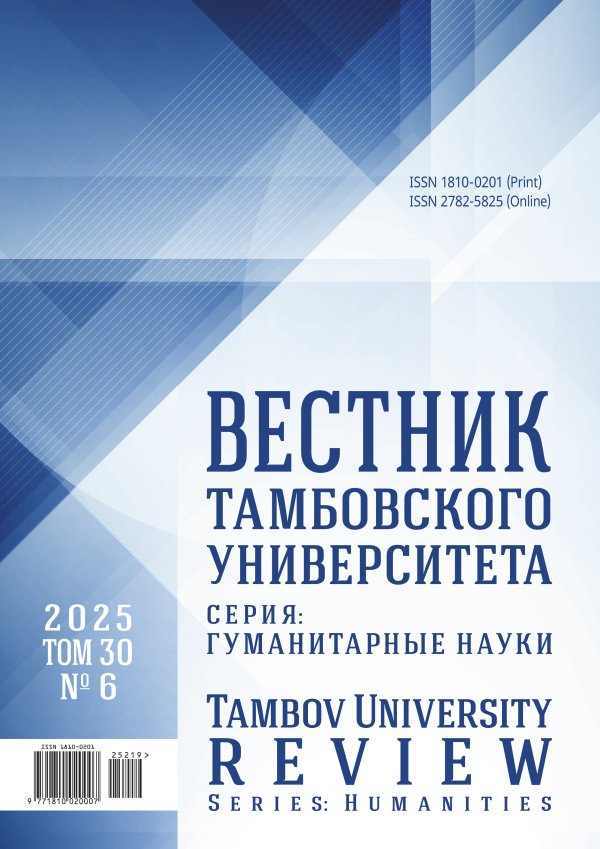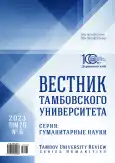Дидактические и методические функции чат-ботов в обучении студентов нелингвистических направлений подготовке иноязычной грамматике
- Авторы: Черкасова Е.А.1
-
Учреждения:
- ФГАОУ ВО «Национальный исследовательский ядерный университет «МИФИ»»
- Выпуск: Том 28, № 6 (2023)
- Страницы: 1443-1451
- Раздел: ТЕОРИЯ И МЕТОДИКА ОБУЧЕНИЯ ИНОСТРАННОМУ ЯЗЫКУ
- URL: https://bakhtiniada.ru/1810-0201/article/view/297881
- DOI: https://doi.org/10.20310/1810-0201-2023-28-6-1443-1451
- ID: 297881
Цитировать
Полный текст
Аннотация
Актуальность. Цифровизация проникает во многие сферы нашей жизни и предоставляет новые возможности и решения. Наряду с этим высшие учебные заведения готовят студентов к работе в профессиональной среде, в которой все чаще используются передовые технические средства. Следовательно, интеграция технологий в образование является необходимой с точки зрения подготовки востребованного специалиста в той или иной отрасли.Материалы и методы. Материалом исследования послужил анализ научной литературы: теоретические и практические исследования современных приложений в рамках обучения английскому языку. Применен эмпирический метод с целью выявления дидактических и методических функций чат-ботов в рамках дифференцированного обучении студентов иноязычной грамматике в технических вузах.Результаты исследования. Сформулированы дидактические функции чат-ботов в контексте обучения иностранному языку: а) доступность; б) возможность персонализированного обучения; в) возможность адаптивного обучения; г) возможность интервального обучения; д) создание ментально-безопасной среды обучения; е) многофункциональность; ж) развитие навыков XXI века. Конкретизированы методические свойства чат-бот-приложений: а) возможность формировать языковые навыки речи обучающихся; б) возможность развития умений иноязычной речевой деятельности.Выводы. Интеллектуальные технологии способны оптимизировать образовательный процесс, делая его более доступным, интерактивным и индивидуализированным. Кроме того, чат-системы могут быть полезным инструментом, способствующим повышению продуктивности обучения грамматике английского языка, в рамках дифференцированного обучения студентов нелингвистических направлений в условиях самостоятельной деятельности.
Об авторах
Е. А. Черкасова
ФГАОУ ВО «Национальный исследовательский ядерный университет «МИФИ»»
Автор, ответственный за переписку.
Email: tomchuk.bel@yandex.ru
ORCID iD: 0009-0001-3517-8074
преподаватель кафедры иностранных языков
115409, Российская Федерация, г. Москва, Каширское шоссе, 31Список литературы
- Ятманов В.А., Фисханова Г.Р. Использование чат-ботов при изучении английского языка // Актуальные проблемы аграрной науки: состояние и тенденции развития: материалы нац. науч.-практ. конф. Димитровград, 2019. С. 126-130. https://elibrary.ru/uftbob
- Сысоев П.В., Филатов Е.М. Чат-боты в обучении иностранному языку: преимущества и спорные вопросы // Вестник Тамбовского университета. Серия: Гуманитарные науки. 2023. Т. 28. № 1. С. 6672. https://doi.org/10.20310/1810-0201-2023-28-1-66-72, https://elibrary.ru/pxgztj
- Сысоев П.В. Современные информационные и коммуникационные технологии: дидактические свойства и функции // Язык и культура. 2012. № 1 (17). С. 120-133. https://elibrary.ru/oxhkzp
- Горячкин Б.С., Галичий Д.А., Цапий В.С. и др. Эффективность использования чат-ботов в образовательном процессе // E-Scio. 2021. № 4 (55). С. 529-551. https://elibrary.ru/zhmmfm
- Dokukina I., Gumanova Y. The rise of chatbots – new personal assistants in learning foreign languages // Procedia Computer Science. 2020. № 169. P. 542-546. https://doi.org/10.1016/j.procs.2020.02.212
- Тоцкая И.В., Недоспасова Л.А. Образовательный потенциал чат-ботов в изучении иностранных языков: социолингвистический, дидактический и коммуникативный аспекты // Научно-методический электронный журнал «Концепт». 2023. № 6. С. 14-27. https://doi.org/10.24412/2304-120X-2023-11045, https://elibrary.ru/vqotsu
- Даггэн С. Искусственный интеллект в образовании: Изменение темпов обучения. М.: Ин-т ЮНЕСКО по информационным технологиям в образовании, 2020. 44 с. URL: https://iite.unesco.org/ru/pub- lications/iskusstvennyj-intellekt-v-obrazovanii-izmenenie-tempov-obucheniya/
- Kukulska-Hulme A., Lee H. Intelligent assistants in language learning: analysis of features and limitations // CALL for Widening Participation: Short Papers from EUROCALL 2020. Copenhagen, 2020. P. 172-176. https://doi.org/10.14705/rpnet.2020.48.1184
- Schmidt T., Strasser T. Artificial Intelligence in Foreign Language Learning and Teaching: A CALL for Intelligent Practice // Anglistik. 2022. Vol. 33. № 1. P. 165-184. https://doi.org/10.33675/ANGL/2022/1/14
- Будникова А.С., Бабенкова О.С. Использование чат-ботов при изучении иностранного языка // Ученые записки. Электронный научный журнал Курского государственного университета. 2020. № 3 (55). С. 146-150. https://elibrary.ru/alqnan
- Fryer L. Bots as language learning tools // Language, Learning and Technology. 2006. Vol. 10. № 3. P. 8-14. URL: http://llt.msu.edu/vol10num3/emerging/
- Cheng М. Practical Exploration of English Translation Activity Courses in Colleges and Universities under the Background of Artificial Intelligence // Wireless Communications and Mobile Computing. 2022. September 17. Art. 4547342. https://doi.org/10.1155/2022/4547342
- Авраменко А.П., Ахмедова А.С., Буланова Е.А. Технология чат-ботов как средства формирования иноязычной грамматической компетенции при самостоятельном обучении // Вестник Тамбовского университета. Серия: Гуманитарные науки. 2023. Т. 28. № 2. С. 386-394. https://doi.org/10.20310/1810-0201-2023-28-2-386-394, https://elibrary.ru/abfjqp
- Щукин А.Н., Фролова Г.М. Методика преподавания иностранных языков. М.: Изд. центр «Академия», 2015. 288 с.
- Сысоев П.В., Филатов Е.М., Сорокин Д.О. Чат-боты и голосовые помощники в развитии иноязычных речевых умений обучающихся // Язык и культура. 2023. № 63. С. 272-289. https://doi.org/10.17223/19996195/63/14, https://elibrary.ru/cqzkft
- Костюкович Е.Ю. Применение искусственного интеллекта в обучении английскому языку в вузе // Современное педагогическое образование. 2023. № 1. C. 492-496. https://elibrary.ru/jdltkx
- Kim H.S., Cha Y., Kim N.Y. Effects of AI chatbots on EFL students’ communication skills // Korean Journal of English Language and Linguistics. 2021. Vol. 21. P. 712-734. https://doi.org/10.15738/kjell.21..202108.712
Дополнительные файлы









